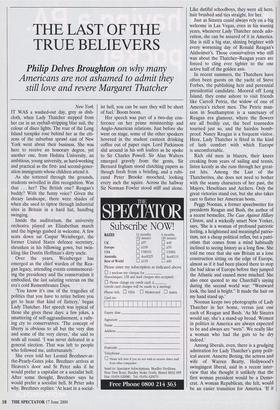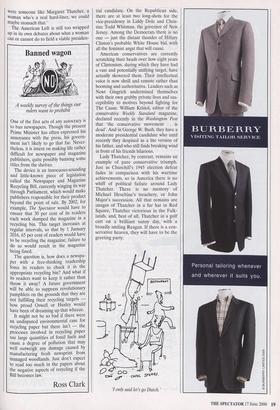THE LAST OF THE TRUE BELIEVERS
Philip Delves Broughton on why many
Americans are not ashamed to admit they still love and revere Margaret Thatcher
New York IT WAS a washed-out day, grey as dish- cloth, when Lady Thatcher stepped from her car in an eyeball-stripping blue suit, the colour of disco lights. The roar of the Long Island turnpike rose behind her as the citi- zens of the suburban sprawl east of New York went about their business. She was here to receive an honorary degree, yet another one, from Hofstra University, an ambitious, young university, as hard-working and practical as the first- and second-gener- ation immigrants whose children attend it.
As she tottered through the grounds, students swivelled in dim recognition. Was that . . . her? The British one? Reagan's buddy? With the funny voice? Given the dreary landscape, there were shades of when she used to tiptoe through industrial sites in Britain in a hard hat, handbag swinging.
Inside the auditorium, the university orchestra played an Elizabethan march and the bigwigs gushed in welcome. A few seats down sat Caspar Weinberger, the former United States defence secretary, shrunken in his billowing gown, but twin- kling like Dustin Hoffman's dirty uncle.
Over the years, Weinberger has emerged as the chief warden of the Rea- gan legacy, attending events commemorat- ing the presidency and the conservatism it embodied, the last saluting veteran on the era's cold Remembrance Days.
'You know it's one of the tragedies of politics that you have to retire before you get to hear that kind of flattery,' began Lady Thatcher. Her speech was typical of those she gives these days: a few jokes, a smattering of self-aggrandisement, a rally- ing cry to conservatives. 'The concept of liberty is obvious to all but the very dim and some of the very clever,' she said to nods all round. 'I was never defeated in a general election. That was left to people who followed me, unfortunately.'
She even told her Leonid Brezhnev-at- the-Pearly-Gates joke. Brezhnev arrives at Heaven's door and St Peter asks if he would prefer a capitalist or a socialist hell. After some thought, Brezhnev says he would prefer a socialist hell. St Peter asks why. Brezhnev replies: 'At least in a social- ist hell, you can be sure they will be short of fuel.' Boom boom.
Her speech was part of a two-day con- ference on her prime ministership and Anglo-American relations. Just before she went on stage, some of the other speakers hovered in the student canteen drinking coffee out of paper cups. Lord Parkinson slid around in his soft loafers as he spoke to Sir Charles Powell. Sir Alan Walters emerged gravely from the gents, Sir Bernard Ingham stood clutching papers as though fresh from a briefing, and a rubi- cund Peter Brooke mooched, looking every inch the squire. Across the hallway Sir Norman Fowler stood stiff and alone. Like dutiful schoolboys, they were all here, hair brushed and ties straight, for her.
Just as Sinatra could always rely on a big welcome in Las Vegas, even in his waning years, whenever Lady Thatcher needs ado- ration, she can be assured of it in America. She is still a big star, shining brighter with every worsening day of Ronald Reagan's Alzheimer's. Those conservatives who still wax about the Thatcher—Reagan years are forced to cling ever tighter to the one active half of the golden axis.
In recent summers, the Thatchers have often been guests on the yacht of Steve Forbes, the publishing heir and perennial presidential candidate. Moored off Long Island, they come ashore to visit friends like Carroll Petrie, the widow of one of America's richest men. The Petrie man- sion in Southampton is a sanctuary of Reagan era glamour, where the flowers are all freshly cut, the beef tournedos tourned just so, and the hairdos bomb- proof. Nancy Reagan is a frequent visitor. Here, Lady Thatcher is feted in the kind of lush comfort with which Europe is uncomfortable.
Rich old men in blazers, their knees creaking from years of sailing and tennis, listen keenly as she runs through her great- est hits. Among the Last of the Thatcherites, she does not need to bother with the seamy characters of her past, the Majors, Heseltines and Archers. Only the great victories stand out, but she also takes care to flatter her American hosts.
Peggy Noonan, a former speechwriter for presidents Reagan and Bush, the author of a recent bestseller, The Case Against Hillary Clinton, and a wickedly smart New Yorker, says, 'She is a woman of profound patriotic feeling, a heightened and meaningful patrio- tism, not a cheap political reflex, but a patri- otism that comes from a mind habitually inclined to seeing history as a long flow. She told me once that she saw Britain as a lone construction sitting on the edge of Europe, almost as if it had been placed there to stop the bad ideas of Europe before they jumped the Atlantic and caused more mischief. She also once quoted to me Churchill's saying during the second world war: "Westward look, the land is bright." It made the hair on my hand stand up.'
Noonan keeps two photographs of Lady Thatcher in her home, versus just one each of Reagan and Bush. 'As Mr Sinatra would say, she's a stand-up broad. Women in politics in America are always expected to be and always are "wets". We really like a woman who had the guts to be dry indeed.'
Among liberals, even, there is a grudging admiration for Lady Thatcher's gutsy polit- ical ascent. Annette Bening, the actress and wife of Warren Beatty, Hollywood's swingingest liberal, said in a recent inter- view that she thought it unlikely that the first woman president would be a Demo- crat. A woman Republican, she felt, would be an easier transition for America. 'II it were someone like Margaret Thatcher, a woman who's a real hard-liner, we could maybe stomach that.'
The American Left is still too wrapped Up in its own debates about what a woman can or cannot do to field a viable presiden- tial candidate. On the Republican side, there are at least two long-shots for the vice-presidency in Liddy Dole and Chris- tine Todd Whitman, the governor of New Jersey. Among the Democrats there is no one — just the distant thunder of Hillary Clinton's probable White House bid, with all the feminist angst that will cause.
American conservatives are currently scratching their heads over how eight years of Clintonism, during which they have had a vast and potentially unifying target, have actually skewered them. Their intellectual voice is now shrill and remote rather than booming and authoritative. Leaders such as Newt Gingrich undermined themselves with their own grubby private lives and sus- ceptibility to motives beyond fighting for The Cause. William ICristol, editor of the conservative Weekly Standard magazine, declared recently in the Washington Post that 'the conservative movement . . . is dead'. And in George W. Bush, they have a moderate presidential candidate who until recently they despised as a lite version of his father, and who still finds breaking wind in front of his friends hilarious.
Lady Thatcher, by contrast, remains an example of pure conservative triumph. Just as Churchill's 1945 election defeat fades in comparison with his wartime achievements, so in America there is no whiff of political failure around Lady Thatcher. There is no memory of Michael Heseltine's treachery, or John Major's succession. All that remains are images of Thatcher in a fur hat in Red Square, Thatcher victorious in the Falk- lands, and, best of all, Thatcher in a golf cart on a brilliant sunny day, with a broadly smiling Reagan. If there is a con- servative heaven, they will have to be the greeting party.
only said let's go Dutch.'











































































 Previous page
Previous page